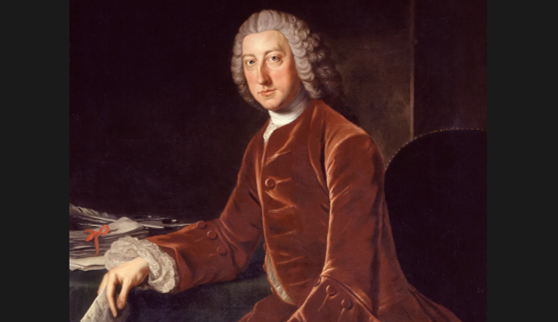January 1775: Pitt the Elder
On January 20, 1775, the most influential English politician of the century arrived at the House of Lords. This was William Pitt the Elder, Earl of Chatham, who had been Prime Minister of England from 1766 to 1768, and before that the guiding power behind two other Prime Ministers who had served from 1754 to 1762. In these roles, Pitt had successfully led England’s development into a world power, with victory over France in the Seven Years War, and expansion into India, West Africa, the West Indies and Canada.
The 67-year-old Pitt had not been seen in some time; he had taken to gardening at his estate while fighting off illnesses such as “gout in the head” which caused temporary insanity. But on this day, he arrived in Parliament arm in arm with a curious figure, the American Dr. Benjamin Franklin, then serving as a colonial agent in London attempting to negotiate agreements to address American grievances over the recently imposed Intolerable Acts. Pitt led Franklin to a seat of honor in the gallery, then stepped up to the podium, and said this:
“The measures of last year, my Lords, which have produced the present alarming state of America, were founded upon misrepresentation— they were violent, precipitate and vindictive. The nation was told that it was only a faction in Boston which opposed all lawful government; that an unwarrantable injury had been done to private property, for which the justice of parliament was called upon, to order reparation;—that the least appearance of firmness would awe the Americans into submission…
But now, my Lords, we find, that instead of suppressing the opposition of the faction at Boston, these measures have spread it over the whole continent. They have united that whole people, by the most indissoluble of all bands—intolerable wrongs. The just retribution is an indiscriminate unmerciful proscription of the innocent with the guilty, unheard and untried…
In order to open a way towards a happy settlement of the dangerous troubles in America by beginning to allay ferments, and soften animosities there; and above all, for preventing, in the meantime, any sudden and fatal catastrophe at Boston, now suffering under the daily irritation of an army before their eyes, and posted in their town, it may graciously please his Majesty that immediate orders be dispatched to General Gage for removing his Majesty’s forces from the town of Boston…”
Pitt then laid out his formal plan for resolving the crisis, which included 1. Parliament recognizing the Continental Congress; 2. No taxation of the colonists without their consent; 3. Such taxes be administered by the colonies over their own people; 4. Recognition by America of Parliament as their supreme authority.
Pitt’s plan would take shape in what became known as the Provisional Act, which would be formally presented to Parliament on February 1, 1775. They would discuss and deliberate and in the end, the House of Lords would overwhelmingly reject it, 77-18 (though one of the dissenting votes would come from King George’s III’s little brother, Prince Henry).
The failure of the Provisional Act would effectively mark the end of William Pitt’s career. And with it went any last hopes for a negotiated peace between England and America.
Spring will come to New England in three months.
